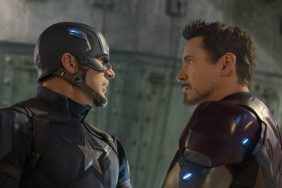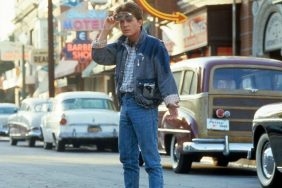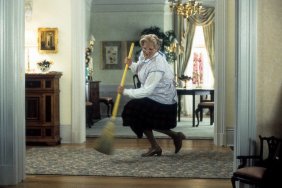Robert Zemeckis has a very special place in the pantheon of great directors, somewhere between the Americana traditions of Steven Spielberg and the visual effects enthusiasm of James Cameron. For several decades now the filmmaker has attempted to “wow” audiences in both ways, producing exhilarating entertainment based on, ultimately, intimate stories about a kid and his parents (Back to the Future), a marriage torn apart by workplace responsibilities (Who Framed Roger Rabbit, if you think about it) and, in his latest movie, a man and his daredevil obsessions (The Walk).
He won the Oscar for the acclaimed drama Forrest Gump, but apparently that’s not the best Robert Zemeckis movie ever made. At least, that’s not what our critics think. This week on The Best Movie Ever, William Bibbiani, Witney Seibold and Collider’s Brian Formo are debating which film represents the height of Zemeckis’s career… and they all seem to think that he peaked in the 1980s.
What’s YOUR favorite Robert Zemeckis movie? Let us know, and come back next Wednesday for another highly debatable installment of The Best Movie Ever!
Previously: The Best Movie Ever | Matt Damon
The Best Robert Zemeckis Movies List
Brian Formo’s Pick: Back to the Future (1985)

Universal Pictures
In many of Robert Zemeckis’ films there’s an idea that maybe humans aren’t so evolved; even as we create new cultures and technologies, we still have basic needs. For instance, Jodie Foster went to the edge of the universe to learn that she needed to move past her father’s death in Contact; and Robin Wright’s indulgences in counter-culture shortened a life that could’ve included more true love in Forrest Gump.
But Zemeckis’ best film, Back to the Future, counters the constant yearning to go back to a time and place that we’re told by corporate culture was better. Released in a 1980s era which championed excess in money, sex, and redefined what personal success is, Zemeckis took a journey back to the 50s, when necking was the goal, when brand names weren’t on underwear, when sequels didn’t exist, and when well-meaning people who couldn’t stand up for themselves had the same access to the American Dream that pompous jerks did. Or so we’re told.
For anyone born in the last 20 years, Back to the Future is probably in our DNA. It’s one of the most nostalgic films not because we’re nostalgic for the 50s—the time period that its set in—but for the time that we very first saw it, and it makes us love our own time period. It was one of the earliest films that applied an expressed manual of rules for time travel and drove home the idea that your past creates consequences for the future. It’s a nostalgic film that wants to only briefly revisit an era because its hero, Marty (Michael J. Fox), needs to get back to a time that he actually understands. And in Zemeckis’ filmography—including his new film from this week, The Walk, which has an aching awareness that nothing is forever—time is something that becomes less and less relatable. So we shouldn’t want to lose any of it.
William Bibbiani’s Pick: Back to the Future (1985)

Universal Pictures
Like most people, you’ve probably seen Back to the Future several times. And if you haven’t, WHAT IS WRONG WITH YOU THIS MOVIE IS AMAZING.
In any case, I encourage you to go back and watch Back to the Future again. And again. And again and again and again because few films reward multiple viewings as well as Zemeckis’s time travel classic. The next time you sit down with the adventures of Marty McFly, pay extra close attention during the first act. For about 30 minutes, Zemeckis – co-writing with Bob Gale – uses every single frame to establish plot points and sight gags that will pay off later. Take special note of the name of mall where Marty and Doc meet to try out the time machine. Take note of it later. Get it?
Brian spoke quite eloquently about the heartwarming power of Back to the Future. The film has potent themes about parenthood and empathy and courage. But formally, just in its construction, there are few cinematic stories as carefully laid out as Back to the Future, and fewer still that reveal themselves as naturally and excitedly. Zemeckis can’t wait to show us what’s next. He can’t wait to get to the next joke. He can’t wait to thrill us.
And yes, the ending… is problematic. Many have argued that the ramifications of Marty McFly’s trip back to 1955 has confusing and even horrifying repercussions on the present day. But funnily enough, they didn’t start arguing that point until the last few years. Lots of movies, even great movies, have their fair share of flaws. But if it takes an obsessive fan base multiple decades to notice any of them, that’s damn good filmmaking regardless.
Witney Seibold’s Pick: Who Framed Roger Rabbit (1988)

Buena Vista Pictures
Whether or not one enjoys Robert Zemeckis movies – and he does have his share of detractors – one can perhaps appreciate his filmmaking ethos. Like James Cameron, Zemeckis will typically only direct a movie if he can do something new and daring with big-budget cinema technology. This philosophy has made for a series of spectacular blockbusters that, while not always necessarily great or successful, are at least boldly, commercially cinematic in the mainstream Hollywood sense. Bold, bright, clear, crisp. Even when dealing with morally sticky or rough subject matter (as in, say, Flight), the ambiguity is held up in stark relief, so there is no ambiguity about the ambiguity (if that makes sense). Zemeckis’s films are forthright, gorgeous, often fun, and only in the worst cases bland.
On the surface, his 1988 mega-hit Who Framed Roger Rabbit? is just another attempt at impressive, and successful gimmickry. Using state-of-the-art filming techniques, and some damn fine animation from Richard Williams – not to mention some of the trickiest wrangling of licensed characters ever seen in a movie – Zemeckis constructed a world where cartoon characters and real-life people convincingly occupied the same rooms. And it is astonishong. Judging by the SFX techniques and the visuals alone, Who Framed Roger Rabbit? is still one of Zemeckis’ crowning achievements.
But beyond that, Roger Rabbit is actually one of the finer noir films within the genre. It provides us with a wonderfully put-upon alcoholic detective in Bob Hoskins, and puts him through a story about murder, studio politics, and, yes, racism in Hollywood; what is Toon Town, if not the ghetto? In terms of noir tropes, a great story, and awesome characters, Roger Rabbit does everything impeccably. Plus, Jessica Rabbit – modeled after Rita Hayworth in Gilda – has remained a strangely persistent sex symbol throughout much of pop culture. This film was a huge hit, won a special Academy Award, and is Zemeckis’ best.
Let us know what you consider the best Robert Zemeckis movies ever in the comment section below!






